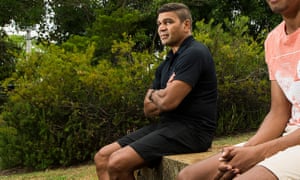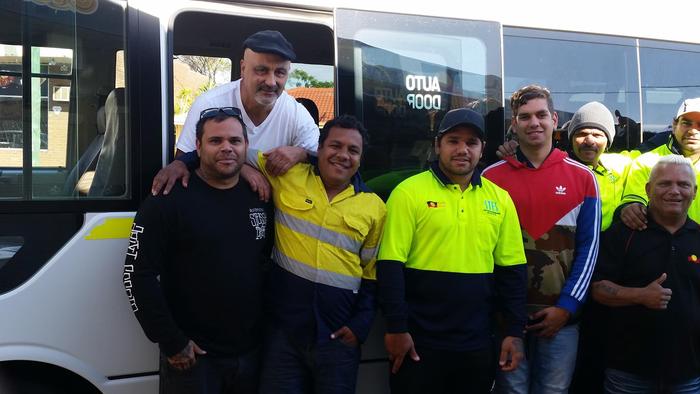Ben Hurst (not his real name) has reached a significant milestone. For the first time since he was 10 years old – the youngest a child can be to be charged with a crime in Australia – he has a clean slate.
He has no bail conditions to meet and no youth justice orders. No sentence suspended nor time left to serve. He doesn’t have to check in at the police station, or give a drug test, or wake in the night to the flashlights of police officers making sure he is in his bed.
“I don’t really know what it feels like to be off orders, but now I do,” the 18-year-old says.
“I never really got to grow up like a proper teenager,” he says.
Most of his friends and family are still on that path but Hurst is determined not to rejoin them.
If he feels he might be slipping, he gives Dale Kickett a call.
Kickett is a mentor at the Wirrpanda Foundation, an organisation founded by the Australian football legend David Wirrpanda to support Indigenous children to stay in school and Indigenous adults to connect with the workforce. He met Hurst at Perth’s Banksia Hill detention centre in early 2015.
Hurst, then 16, was coming to the end of a 14-month sentence for a series of high-speed chases with police and a number of burglary offences. It was his first significant stretch in detention and he didn’t want to go back.
“The whole time I was in there, I seen boys get out for a week, come back in,” he says. “Some boys would get out for three days, come back in.”
It’s a common pattern. Indigenous children in WA are 53 times more likely to go to jail than non-Indigenous children. At any given time, one in 77 Aboriginal boys in WA is in detention.
It’s higher than the black imprisonment rate in the United States: Indigenous children in WA are imprisoned at a rate of 78 for every 10,000, compared with 52 for every 10,000 African-American children.
Hurst started meeting Kickett a few days a week and, when he was released that March, Kickett was there to offer him a lift to meet his youth justice officer, connect him to public housing services, or just drop by for a chat.
“All we can do is help out,” Kickett says. “We don’t want to become part of the system … I mean, have any of the boys become dependent on us. We’ll help them out to where they start doing their own stuff.”
The aim is to reduce recidivism through modelling better behaviour and enforcing positive structures.
In December, 21 boys had completed the program and 12 were partway through. A spokesman for the Department of Corrective Services said the results were “very encouraging”: of the 10 who completed the program in its first year, only five had reoffended. The recidivism rate for young people exiting Banksia Hill is 69%, so 50% is a significant improvement.
Kickett and Cook act as something between caring older brothers and drug and alcohol counsellors. Not forcing change, but reinforcing improvement.
It helps, Kickett says, that they come from the same place.
Like Hurst, he is a Noongar man with family in the justice system. He grew up in Tammin, a wheatbelt town about 180km east of Perth, then moved to the city to play football at the age of 18 and was recruited to the AFL to play for Fitzroy at 22. He went on to play for West Coast, St Kilda, Essendon and Fremantle, before retiring in 2002.

He credits football with keeping him out of prison. “I’ve got very supportive parents, both my parents have been role models in that they worked all their lives,” he says.
“You’re saying to me whether I wondered if I could have gone down another track if I didn’t play football? Well, if I didn’t have that opportunity things may have been a little different.”
Other members of his family were less fortunate.
“Brothers and cousins and uncles – whenever I go to Banksia Hill I see evidence of those blokes.”
Kickett went to school with Hurst’s relatives and is directly related to a number of the other boys he mentors, so when he says they can break out of the prison cycle, they listen. “They can see we’ve done well in what they see as a real hard community to crack,” he says.
Unlike most programs delivered by the youth justice system, Moorditj Noorndiak outlasts the court orders. The mentors work intensively with participants for a year but never really leave their lives, even if they drop out or reoffend. “Once we engage in these boys’ lives and develop that sort of meaningful relationship, you know them forever,” Kickett says.
It’s a system of small measures that create small but enduring changes.
“We try and get them to communicate a whole lot more because even the best kids don’t communicate that well with older people when they’re in that teenage period of their lives,” Kickett says. “I’ve had three teenagers and they’re not good at basic communicating, and they have supportive parents.
“For these young fellas, maybe they don’t get as much support as they need to stay in school, or in a training program, or into employment or community engagement.”
Sport is often used to hook Indigenous kids back into community structures, but Kickett says without practical support at home, even that can fail.
Teenagers are a “different kettle of fish”, he says: the wrong football boots, or the wrong clothes, can set them back.
“Simple things like fashion, it’s just like, ‘Nah, I’m not going to school, I haven’t got the right shoes on,’” he says. “It’s just little things like that that we’ll try and help out with.”
They also work with youth justice officers to make orders a little bit more flexible. Many boys go back to detention for a technical breach such as failing to meet a 7pm curfew, Kickett says.
He draws parallels between the discipline required to play professional football and the discipline required to stay out of jail. Both mean severing ties with family and friends who might divert you from your path.
That’s difficult in Banksia Hill, where 80% of detainees are Indigenous. As of 28 November 2016, 101 of the 126 detainees identified as Aboriginal or Torres Strait Islander.
It makes the detention centre almost a welcoming place for young Noongar boys such as Hurst. There are more Aboriginal faces in the classroom – and more Aboriginal support – than in the outside world.
“We always see the best of the boys in Banksia because they have obviously disciplines and structures in there,” Kickett says. “When the boys come out, go back to their home lives, it changes a bit. You get back involved in mates, friends, cousins, brothers … back on the cycle that put them in Banksia in the first place.”
Judge Denis Reynolds, president of the children’s court in WA, says Aboriginal-led services are an “integral part of the solution”.
“Having a healthy sense of self-identity is essential for Aboriginal young people to connect with community,” he says. “For them to develop a healthy sense of self-identity, they need to be given knowledge of their culture, family and country. Only Aboriginal people can do that.”
Reynolds says the Wirrpanda Foundation, through the Moorditj Noorndiak program, deals with “the most difficult and complex cases”.
“Therefore, the good successes that it is having with some young people on its pre- and post-release programs is of substantial social and financial benefit to the community as well as to the young people themselves,” he says.
Hurst is an adult now but he looks younger, with the hint of a beard and a black backwards baseball cap perched high on his head.
For the 21 months since his release, he has barely seen his family. He calls jail to talk to his older brothers and they’re supportive, but they don’t really understand. He is trying to talk his younger brother into following his example.
“I don’t talk to my parents or anything, I just stay by myself, live by myself, do my own thing,” he says.
Before he went to Banksia Hill, Hurst says he was chased by police at least once a week, a pattern established because he was “just hanging around the wrong people, liked to drive cars and didn’t have a licence”.
“I only did it because that was the only thing what kept me like occupied until I got into this program and I knew to stop hanging around the people I hang around,” he says.
“When I was released, I had the friends what put me in there coming back around wanting to do the same stuff. But I was like, ‘Nah, I can’t afford it, can’t go back in there.’”
He now spends his days with his girlfriend looking after his baby daughter, who he hopes will grow up to be “definitely not like me”.
For her sake, as much as his own, he is determined to keep going and enrol in an employment program at Wirrpanda to try to join the workforce.
He credits his success to Kickett, but his mentor disagrees. “Anything that he has done is a credit to himself not to us, because it’s all about what he wants to do,” he says.
Kickett says attitudes towards incarceration are shifting. Within the justice system, he says, no one wants to send young people to jail. But the problem has built up over generations and must be dismantled person by person.
“Even if we halve [the incarceration rate], we as a race of people are a whole lot better off,” he says. “We can only do that by … trying to empower our mob to make their own decisions for their own futures, and their children’s futures, and their children’s children’s futures.
“That’s the influence we want down the line. Hundreds of people.
“I would like an easier job. I would like to go and dig a hole and put a plant in it and fill it in and water it and walk away. But with our group, it needs a hell of a lot more nurturing than our native plants.”
• Support our independent journalism and reporting on Indigenous issues by giving a one-off or monthly contribution

